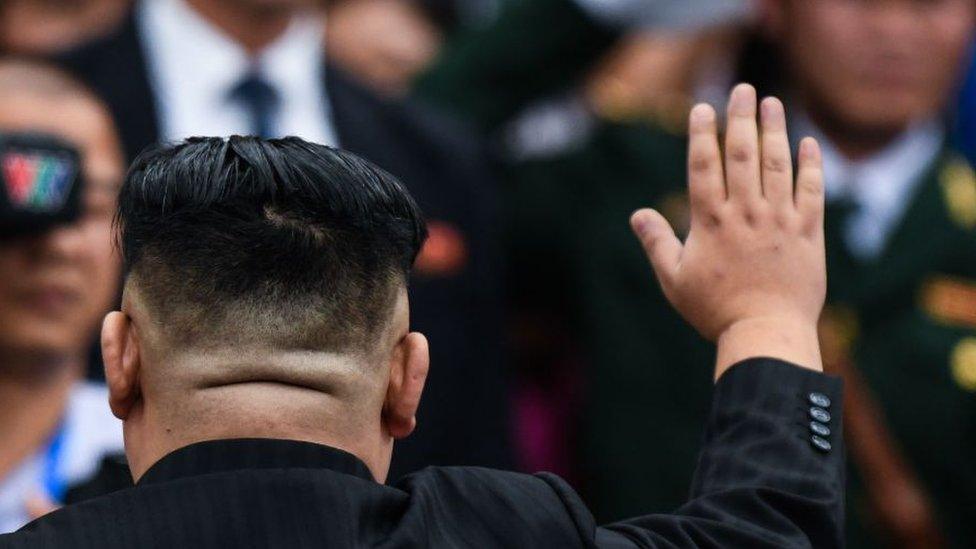US 'hell-bent' on hostility despite talks, North Korea says
- Published
President Trump held a historic meeting with Kim Jong-un on Sunday
North Korea has accused the US of being "hell-bent on hostile acts", despite a recent agreement between the two countries to resume nuclear talks.
Pyongyang's delegation to the United Nations said on Wednesday that the US was "obsessed with sanctions".
This comes days after the countries' leaders held a historic meeting in the heavily fortified demilitarised zone (DMZ) which divides the two Koreas.
Donald Trump became the first sitting US president to set foot in the North.
And after talks that lasted for almost an hour, the pair agreed to set up teams to resume stalled negotiations on denuclearisation.
But the latest North Korean statement marks a shift in tone and a return to the angry exchanges that have marred relations between the countries in recent times.
North Korea also accused Washington of attempting to "undermine the peaceful atmosphere" on the Korean peninsula.
What did North Korea say?
The North Korean delegation said it was responding to a US allegation that it had breached a cap on refined petroleum imports that was set in 2017.
It also said it was responding to a joint letter sent by the US, France, Germany and the UK to all UN member states that called on all countries to comply with sanctions on North Korea, including the repatriation of North Korean workers home.
Under UN sanctions imposed in December 2017 after ballistic missiles tests, all North Korean nationals working abroad have to return home by the end of 2019, restricting a vital source of foreign currency.
"What can't be overlooked is the fact that this joint letter game was carried out by the permanent mission of the United States to the UN under the instruction of the state department, on the very same day when President Trump proposed [a] summit meeting," the statement read.
"[It] speaks to the reality that the United States is practically more and more hell-bent [on] hostile acts against the DPRK [North Korea]."
"All UN member states will have to keep vigilance against deliberate attempts by the United States to undermine the peaceful atmosphere that has been created on the Korean Peninsula," it said.
Pyongyang added that it was "quite ridiculous" for the US to view sanctions as a "panacea for all problems".
The US has yet to respond to the statement.

Why has the atmosphere changed so quickly?

North Korea's harsh language is a powerful corrective to the euphoria prompted by President Trump's brief steps across the DMZ.
It's also a reminder, as another phase of diplomatic contacts beckons, that negotiating with Pyongyang is never going to be easy.
On the face of things, neither side has fundamentally shifted its position, though there are reports that inside the Trump team there are discussions about pursuing a more limited initial objective to freeze Pyongyang's nuclear programme rather than to seek full denuclearisation.
But North Korea still wants to get tangible economic gains upfront and is evasive about mothballing its nuclear programme.
And its leader may have been strengthened by his three meetings with Mr Trump, irrespective of the minimal results obtained.

How are US-North Korea relations?
Negotiations with North Korea to try to convince it to abandon its controversial nuclear programme reached a peak last year when Mr Trump and North Korean leader Kim Jong-un held a summit in Singapore.
They both committed to the "complete denuclearisation" of the Korean peninsula, but without clarifying what that meant.
Donald Trump and Kim Jong-un: From enemies to frenemies
It was hoped their second meeting, in Hanoi in February, would make some concrete agreement about North Korea handing over its nuclear programme in exchange for some of the tight sanctions against it being lifted.
But those talks ended with no deal, as they failed to agree on the pace at which sanctions should be eased. Since then the negotiations have stalled, though Mr Kim and Mr Trump have exchanged letters.
And in May, North Korea carried out new weapons tests widely seen as an attempt to increase pressure on the US.
At Sunday's DMZ meeting their exchanges were largely complimentary.
Mr Trump - who once referred to Mr Kim as "little rocket man" - called their friendship "particularly great" and said it was a "great day for the world".
- Published30 June 2019
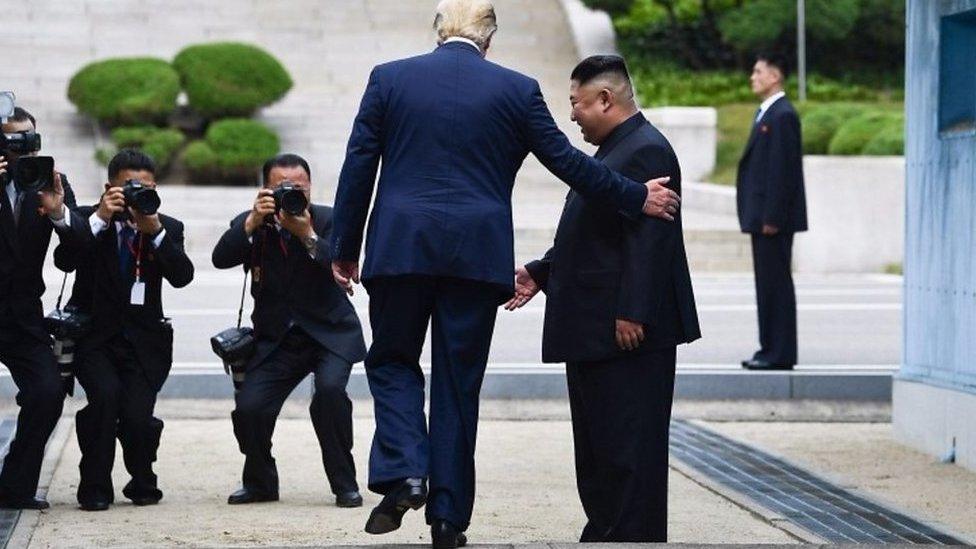
- Published30 June 2019
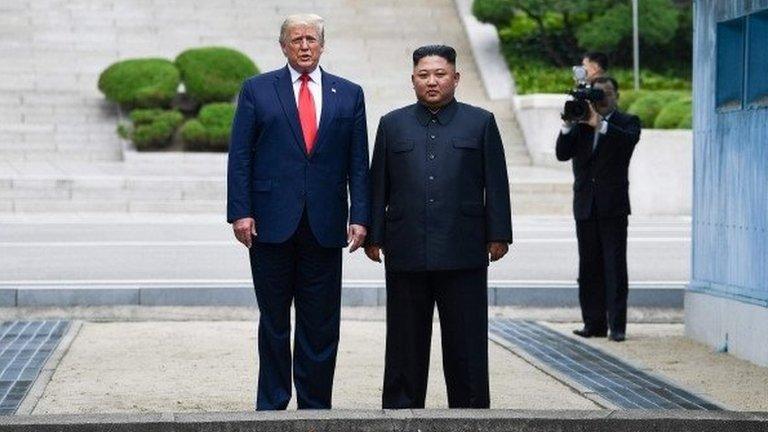
- Published1 July 2019
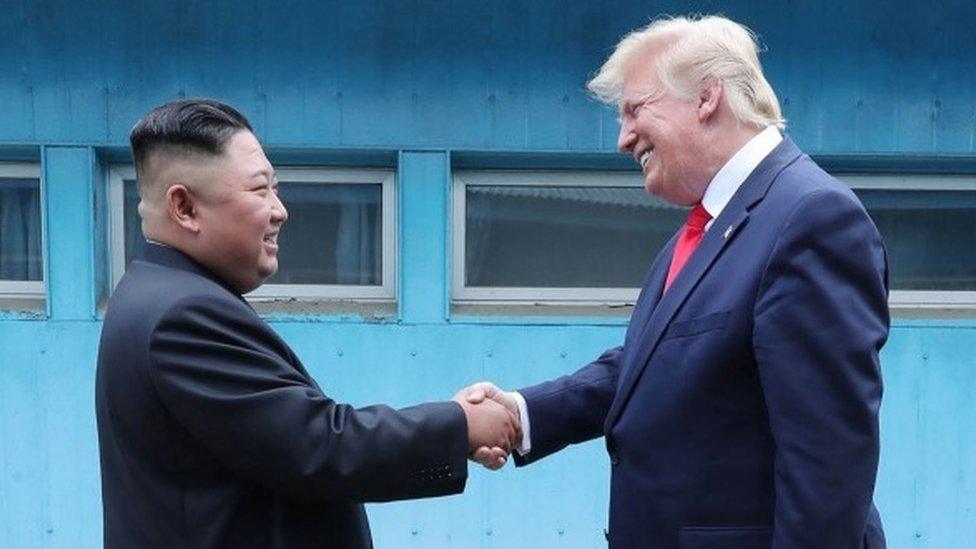
- Published30 June 2019

- Published18 February 2019
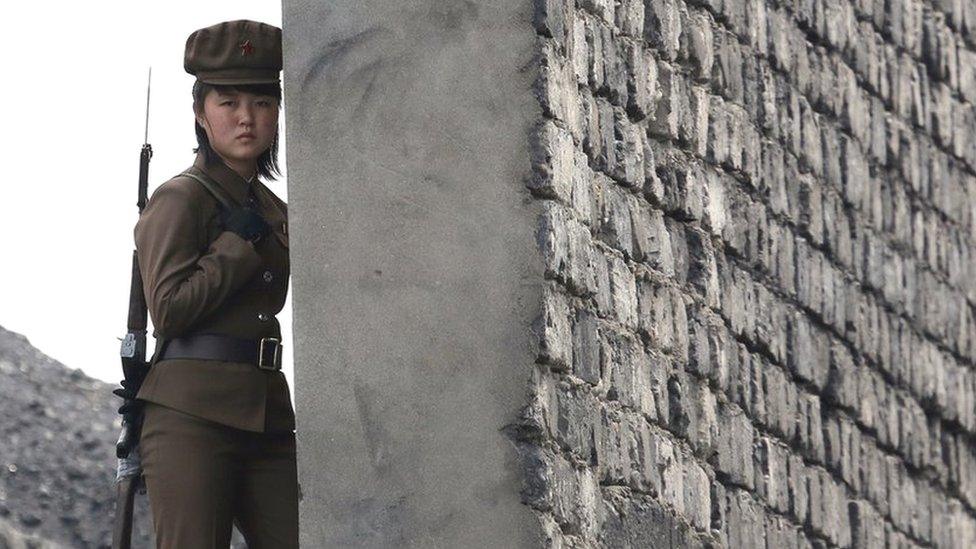
- Published20 June 2019
